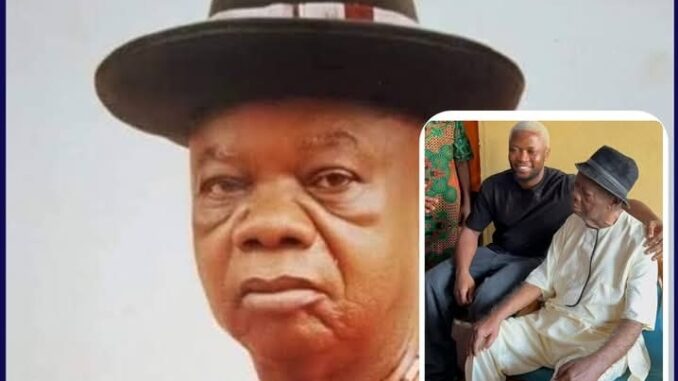
The Nigerian music scene and Igbo cultural heritage mourn the loss of a towering figure, Sir Mike Ejeagha, who passed away on June 6, 2025, at the age of 95. Known as the “Gentleman” of Igbo folklore music, Ejeagha’s legacy as a storyteller, musician, and cultural custodian has left an indelible mark on generations, with his iconic song “Gwo Gwo Gwo Ngwo” resonating across Nigeria and beyond.
Born on April 4, 1930, in Imezi-Owa, Ezeagu Local Government Area of Enugu State, Mike Ejeagharibe, fondly called Sir Mike Ejeagha, was a revered highlife musician and folklorist whose career spanned over six decades. With more than 37 albums and five singles to his credit, Ejeagha rose to prominence in 1960 with his seminal hit “Ofu Nwa Anaa,” a song that showcased his unique ability to weave intricate Igbo folktales with melodic highlife rhythms. His music, often described as a “living archive” of Igbo heritage, blended wisdom, humor, and moral lessons, earning him the title “Ome Ka Agụ” (the one who acts like a leopard) among his fans.
Ejeagha’s signature song, “Gwo Gwo Gwo Ngwo,” became a cultural phenomenon, particularly in recent years, as it gained renewed popularity through social media and modern reinterpretations. The song, rooted in Igbo storytelling, exemplifies his ability to preserve cultural narratives while captivating audiences with its infectious rhythm. Other classics like “Onye Ori Ụtaba,” “Odogwu Nari Enu,” and “Ụwa Mgbede Ka Mma” further cemented his reputation as the father of Igbo folklore music.
Social media platforms, particularly X, have been flooded with tributes reflecting the profound impact of Ejeagha’s work. Fans and admirers celebrated his long life and contributions, with many noting his warm smile and humility. One post described him as “a true Igbo treasure” whose melodies “etched the soul of our heritage into eternity.” Another expressed pride in his graceful aging, stating, “You lived and aged very well. Jee nke oma, mowu shinne” (Rest well, great spirit).
Ejeagha’s influence extended beyond music, serving as a bridge between generations by preserving Igbo oral traditions in an era of rapid modernization. His storytelling, often accompanied by his guitar and harmonious vocals, brought to life tales of wisdom, morality, and community values, making him a cherished figure in Igbo households and beyond.
The news of his passing has sparked an outpouring of grief and celebration of his life across Nigeria. Cultural organizations, musicians, and fans have called for his legacy to be honored through continued promotion of Igbo folklore and highlife music. While no official statement has been released by his family, sources close to the musician confirmed his peaceful passing, noting that he “smiled before saying goodbye.”
Sir Mike Ejeagha is survived by his family, countless admirers, and a rich musical legacy that will continue to inspire. As Nigeria bids farewell to this cultural icon, his songs remain a testament to the enduring power of storytelling and the resilience of Igbo heritage.
Jee nke oma, Gentleman Mike Ejeagha.
Leave a Reply